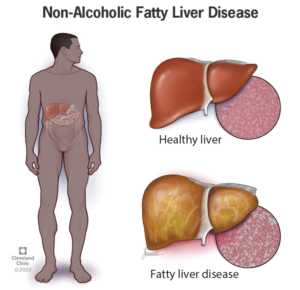
Did you know that more than a third of adults don’t get the recommended seven to eight hours of sleep each night? This lack of sleep doesn’t just leave you feeling groggy—it can also impact your health in surprising ways. One of these hidden effects is the risk of developing non-alcoholic fatty liver disease (NAFLD), a condition that’s been called a “silent epidemic.”
What Is Non-Alcoholic Fatty Liver Disease (NAFLD)?
NAFLD is a condition where fat builds up in the liver, not due to heavy alcohol use but because of other factors like weight gain, type 2 diabetes, high blood pressure, high triglycerides, and sleep apnea. It’s considered “silent” because most people don’t show symptoms, making it hard to diagnose early.
According to the American Heart Association, more than one in four American adults may have NAFLD. That’s a significant number, but most people don’t even know they have it because they feel fine. If symptoms do appear, they are usually vague—like fatigue, foggy memory, or abdominal pain.
While NAFLD refers to fatty liver that isn’t caused by alcohol, there’s a more severe form of the disease called non-alcoholic steatohepatitis (NASH). NASH leads to inflammation and damage to liver cells, potentially causing scarring, also known as fibrosis. This progression can eventually lead to circulation, liver failure, or even liver cancer.
The Role of Sleep in NAFLD
Research indicates a link between sleep duration and NAFLD. Postmenopausal women are at particularly high risk, with one study showing that chronic short sleep duration led to a 20% increase in insulin levels, a key factor in metabolic diseases like diabetes, compared to a 15% increase overall.
Given the “silent” nature of NAFLD, experts recommend that people with risk factors—like those mentioned earlier—get screened for fatty liver disease, even if they don’t have any symptoms. Managing these risk factors, especially type 2 diabetes, is crucial in preventing the progression of fatty liver disease.
If left unchecked, it can progress to end-stage liver disease, posing significant health risks and economic costs to society. As sleep patterns evolve with modern life, it’s important to understand how these changes might affect our health, including conditions like NAFLD.
If you have NAFLD, you might also be experiencing fatigue, and there’s a good reason for that. Here are five key factors that could explain the connection:
1. Inflammation
When there’s too much fat in the liver, it can cause inflammation. This inflammation releases certain chemicals called pro-inflammatory cytokines, which can make you feel sluggish and generally unwell.
2. Impaired Liver Function
The liver plays a critical role in how your body produces and manages energy. If NAFLD starts to affect how well your liver works, it can throw off your energy levels, leading to fatigue.
3. Associated Health Conditions
NAFLD often doesn’t come alone. It can be linked to other conditions like obesity, type 2 diabetes, and metabolic syndrome. These health issues can each cause fatigue, and when combined with NAFLD, the tiredness can feel even more intense.
4. Sleep Problems
NAFLD has been connected to various sleep issues, like sleep apnea or poor sleep quality. When your sleep isn’t as restful or is frequently interrupted, it’s no wonder you feel tired during the day.
5. Reduced Physical Activity
When you have NAFLD, you might find yourself less active due to the fatigue or even physical pain that comes with it. This reduction in exercise can lead to even more fatigue and a sense of overall tiredness.
If you’re concerned about NAFLD, it’s important to talk to a healthcare professional. They can help screen for the disease and guide you on managing risk factors. And remember, getting enough sleep isn’t just about feeling rested—it’s also about keeping your liver and overall health in check. You can also take part in a free consultation with The Alaska Sleep Clinic to help with your sleep needs.











